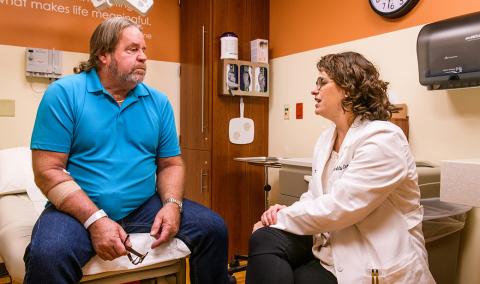If you have been diagnosed with a cancer of the digestive system, MU Health Care has an experienced cancer care team ready to create a treatment plan focused on you.
At MU Health Care, we offer the most advanced and personalized gastrointestinal cancer care in the region. Our dedicated care starts at the check-in desk and includes a team of doctors, nurses and staff who work with you to tailor a treatment plan that fits your needs.
Gastrointestinal Cancers We Treat
We offer a wide variety of advanced treatment options for:
- Appendiceal (appendix) cancer
- Bile duct cancer
- Colon cancer
- Duodenal and small bowel cancer
- Gallbladder cancer
- Gastric (stomach) cancer
- Esophageal cancer
- Liver cancer (primary and metastatic)
- Pancreatic cancer
- Rectal cancer
- Stomach cancer
How We Treat Cancer
If you have been diagnosed with gastrointestinal, biliary tract, liver or pancreas cancer, our team, which includes oncologists, surgeons, pathologists, nurses, therapists, pharmacists and support staff, will work together to make sure you are supported in understanding your diagnosis and treatment options.
Many of our treatment options fall under three main categories:
- Systemic therapy, which includes chemotherapy, a group of drugs that attack fast-growing cancer cells in your body, and immunotherapy, treatments that help your body’s immune system fight the cancer
- Radiation therapy, which destroys the DNA of cancer cells and prevents them from multiplying
- Surgery, which carefully removes large groups of cancer cells, or tumors
Gastrointestinal Cancer Treatments We Offer
Chemotherapy, radiation therapy and surgery can all be targeted to damage cancerous cells more accurately without damaging healthy ones. Targeted therapies, also called precision medicine, for gastrointestinal, biliary tract, liver and pancreas cancers can benefit patients who have advanced cancer diagnoses or have recurrent or metastatic cancers because they can be carefully guided to parts of the body that are otherwise difficult to reach.
Chemoembolization Therapy
Chemoembolization therapy is a cancer treatment that delivers high doses of medicine to directly target cancerous tissue. Your interventional radiologist uses a small catheter to inject chemotherapy drugs into the artery that supplies blood to the tumor. This procedure blocks blood flow to the tumor while delivering chemotherapy to the site of a tumor.
Hepatic Arterial Infusion (HAI)
Hepatic arterial infusion, or HAI, is an advanced, minimally invasive treatment for primary or metastatic liver cancers. Colorectal cancer liver metastases (CRLM) with a high rate of recurrence, as well as bile duct cancers and intrahepatic cholangiocarcinoma (iCCA) that can’t be removed surgically, can be treated through HAI.
HAI targets chemotherapy to the liver by implanting a pump and connecting it to the hepatic artery, the liver’s main supply of oxygenated blood. Chemotherapy is delivered to the pump through a port and then to the kidney and can provide up to 400 times the drug concentration than systemic infusion chemotherapy.
MU Health Care is one of two health systems in the state, and the only one in mid-Missouri, to offer HAI.
Hyperthermic Intraperitoneal Chemotherapy (HIPEC)
Hyperthermic intraperitoneal chemotherapy, or HIPEC, is a precision medicine treatment for advanced, recurrent abdominal cancers (appendix, colorectal and stomach cancers as well as mesotheliomas) that have spread to the abdominal lining, called the peritoneum.
During HIPEC, your care team fills your abdominal cavity with a solution that contains chemotherapy medication. This targeted delivery means 90% of the medication stays in the abdominal cavity, is absorbed there and can lead to less body weakness than systemic chemotherapy. If your abdominal cancer has not responded to other treatment options, ask your doctor for a referral. MU Health Care is one of three health systems, and the only one in mid-Missouri, to provide HIPEC treatment.
Radioembolization Oncology
Radioembolization oncology is a procedure used to treat primary or metastatic liver cancer. Similar to chemoembolization, your interventional radiologist uses a catheter to deliver microscopic radioactive beads into the liver to treat tumors that cannot be surgically removed.
Because of the size of the beads, and by using a catheter, radioembolization delivers targeted doses of radiation to the tumor while limiting radiation exposure to healthy liver cells.
Colon Cancer Care
From screening to long-term follow-up care, our doctors, nurses and researchers work collectively to ensure every patient receives the best, most advanced care. Together with patients and their loved ones, we’re the team it takes to prevent and overcome cancer. Read more in our cancer screening guide.
Call to schedule a screening.
Leading-Edge Research and Clinical Trials
As an academic health system, our cancer doctors are trained on the latest changes and improvements in cancer care or are the ones finding new treatments through research. Our doctors also participate in clinical trials, which offer cancer care options that are not widely available.



























